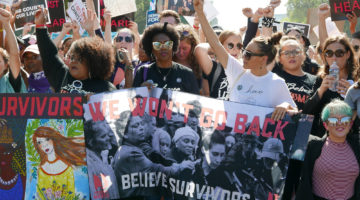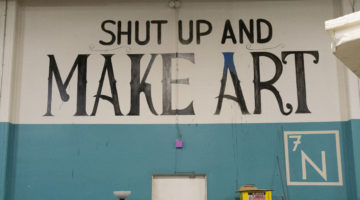During his opening monologue on “Saturday Night Live,” comedian Larry David took on producer Harvey Weinstein and the sexual allegations that have rocked Hollywood in recent weeks.
He said he’s noticed a “pattern” that many of the sexual predators in the news have been Jewish. David, a Jewish man himself, said he was disappointed by prominent Jews’ negative attention in the news. He then went as far as to venture what it would be like to hit on women in concentration camps during World War II.

Photo by David Shankbone via Wikimedia Commons
Larry David, writer and comedian, at the Tribeca Film Festival in 2009. David hosted sketch comedy show “Saturday Night Live” last weekend where his opening monologue bombed, and he was criticized for insensitive jokes about the Holocaust and rape culture.
“I’ve always, always been obsessed with women,” David said. “I’ve often wondered, if I grew up in Poland, when Hitler came to power, and was sent to a concentration camp, would I still be checking out women in the camp? I think I would…Of course the problem is that there are no good opening lines in a concentration camp.”
David, who is responsible for TV greats such as “Seinfeld” and “Curb Your Enthusiasm,” should have known that these types of jokes crossed the line. Not only were they insensitive to survivors of the Holocaust, which is a whole other issue unto itself, but it diminishes the issue of sexual assault.
David’s monologue brings to mind two issues: one, he referenced Weinstein, after SNL decided not to do skits about the Hollywood producer immediately after allegations came to light. A disturbing revelation about Weinstein was the fact that scores of people who knew him were also aware of his behavior as a serial sexual assaulter. Second, David joked about rape at the expense of the victims themselves.
Headlines the day after wrote of David’s insensitivity rather than the issue at hand — the women who are victims of a powerful man’s sexual advances.
More than 20 women have come forward to speak about their encounters with Weinstein.
Lupita Nyong’o, an Oscar-winning actress for “12 Years a Slave,” told The New York Times that Weinstein repeatedly made advances at her and made her uncomfortable, and described a time where she gave him a massage to avoid a sexual encounter.
“Before long he said he wanted to take off his pants,” Nyong’o said to The New York Times. “I told him not to do that and informed him that it would make me extremely uncomfortable.”
Actress and model Cara Delevingne described a similar encounter on her Instagram.
“He walked me to the door and stood in front of it and tried to kiss me on the lips. I stopped him and managed to get out of the room,” she wrote. “I still got the part for the film and always thought that he gave it to me because of what happened. Since then I felt awful that I did the movie. I felt like I didn’t deserve the part. I was so hesitant about speaking out. I didn’t want to hurt his family.”
Actress Rose McGowan accused Weinstein of raping her. She said he paid her a settlement in 1997 after sexually assaulting her at the Sundance Film Festival. She was 23.
There are dozens more women who have come forward to speak about Weinstein’s aggressive sexual advances, and other actors that have shined a light on more Hollywood stars’ behavior — such as “House of Cards” star Kevin Spacey.
David has a platform to talk about a very serious issue, and even while he was on a comedy show, sexual assault is not a subject to joke about.
Joking about it does nothing but add to and reinforce rape culture. It takes away from the severity of it. It takes away the legitimacy of the pain the victims are feeling. Joking about sexual assault makes it rational and okay. Weinstein felt like he had a right to these women’s bodies, whether they gave him permission or not. They have spent years in silence, struggling internally with what happened to them, and not speaking out until they felt safe to do so. They have feared this man would take advantage of them again, and use his power to get to their bodies.
Hollywood has a secret culture of doing “whatever it takes to get to the top”. But these actors and actresses would have become who they are without suffering sexual harassment and rape. They would have been better off without it. No one should have to endure someone else violating their body to get ahead in their career. No one should have to endure someone else violating their body period.
David isn’t the first one to take heat for “rape jokes.” Daniel Tosh was bashed for an insensitive joke in 2012, and Dane Cook took equal criticism for defending him. This led to a widespread discussion about when these kinds of jokes can be okay. And smart people actually came to a consensus.
In her article “If rape jokes are finally funny it’s because they’re targeting rape culture” Rebecca Solnit wrote for the Guardian, “That rape jokes aren’t funny was an axiom assuming that rape jokes are at the expense of the victim. Something horrible happened to you, hahhahha! I’m going to violate and degrade a woman and deny her humanity hohohoho! It’s funny to me and you don’t matter! People then drew a distinction between punching down (mocking the less powerful) and punching up (aiming at the privileged, the status quo, maybe even striking blows against the empire). The rape joke as it then existed was all about punching down.”
These types of jokes are acceptable when they’re at the expense of the oppressor, not the oppressed.
David is already in a position at the top of the social spectrum. His net worth is estimated in the hundreds of millions of dollars. If he were to make jokes at the expense of the powerful (the kind of jokes that are good for everybody), he would only be punching sideways. Instead, he chose to punch down at the victims. On top of that, his jokes weren’t even funny. That’s always noteworthy when jokes become controversial.
So for the time being, we must demand better.
The editorial board can be reached at jsolis@sagebrush.unr.edu and on Twitter @NevadaSagebrush.












